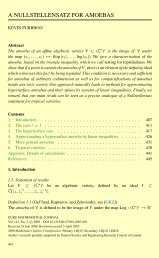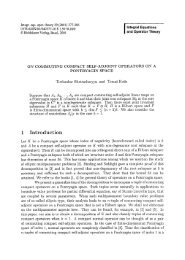computing lives - FTP Directory Listing
computing lives - FTP Directory Listing
computing lives - FTP Directory Listing
You also want an ePaper? Increase the reach of your titles
YUMPU automatically turns print PDFs into web optimized ePapers that Google loves.
A<br />
Computer Previous Page | Contents | Zoom in | Zoom out | Front Cover | Search Issue | Next Page M S BE<br />
aG<br />
F<br />
PERSPECTIVES<br />
Using Codes of Conduct<br />
to Resolve Legal Disputes<br />
Peter Aiken, Virginia Commonwealth University<br />
Robert M. Stanley and Juanita Billings, Data Blueprint<br />
Luke Anderson, Duane Morris LLC<br />
In the absence of other published standards of care, it is reasonable<br />
for contractual parties to rely on an applicable, widely available code<br />
of conduct to guide expectations.<br />
When legal disputes arise, the primary<br />
focus of judges, juries, and arbitration<br />
panels is on interpreting facts. In<br />
cases of alleged underperformance,<br />
they must evaluate facts against contract<br />
language, which typically states that services will<br />
be provided in accordance with industry standards. Legal<br />
arbiters seek well-articulated “standards of care” against<br />
which to evaluate the behavior of contractual parties and,<br />
in the absence of other published standards, increasingly<br />
rely on codes of conduct (CoCs) to establish an objective<br />
context. In fact, they have successfully applied CoCs—<br />
including the ACM/IEEE-CS CoC—in instances where the<br />
parties were not even affiliated with the CoC-sponsoring<br />
organization.<br />
We illustrate the current application of CoCs with a<br />
fictional enterprise resource planning (ERP) system implementation<br />
failure that is a compilation of real-life cases.<br />
Subject to binding panel arbitration, the plaintiff and defendant<br />
in the case presented conflicting interpretations of the<br />
same facts: From the plaintiff’s perspective, the defendant<br />
0018-9162/10/$26.00 © 2010 IEEE<br />
Published by the IEEE Computer Society<br />
failed to migrate the ERP system as promised; the defendant<br />
countered that defective and poor-quality data delayed<br />
the migration. Using the ACM/IEEE-CS CoC as a reference,<br />
expert testimony convinced the arbitration panel that the<br />
defendant’s position was untenable, and the panel accordingly<br />
awarded the plaintiff a multimillion-dollar judgment.<br />
CASE STUDY<br />
Acme Co. received a directive from its parent corporation<br />
mandating replacement of its legacy pay and<br />
personnel systems with a specific ERP software package<br />
designed to standardize payroll and personnel processing<br />
enterprise-wide. Upon the vendor’s “referred specialist”<br />
recommendation, Acme Co. contracted with ERP Systems<br />
Integrators to implement the new system and convert its<br />
legacy data for $1 million.<br />
The contracted timeline was six months, beginning in<br />
July and wrapping up with a “big bang” conversion at the<br />
end of December. The year-end conversion failed, allegedly<br />
due to ERP Systems Integrators’ poor data migration<br />
practices, and Acme Co. had to run the old and new sys-<br />
APRIL 2010<br />
A<br />
Computer Previous Page | Contents | Zoom in | Zoom out | Front Cover | Search Issue | Next Page M S BE<br />
aG<br />
F<br />
29

















